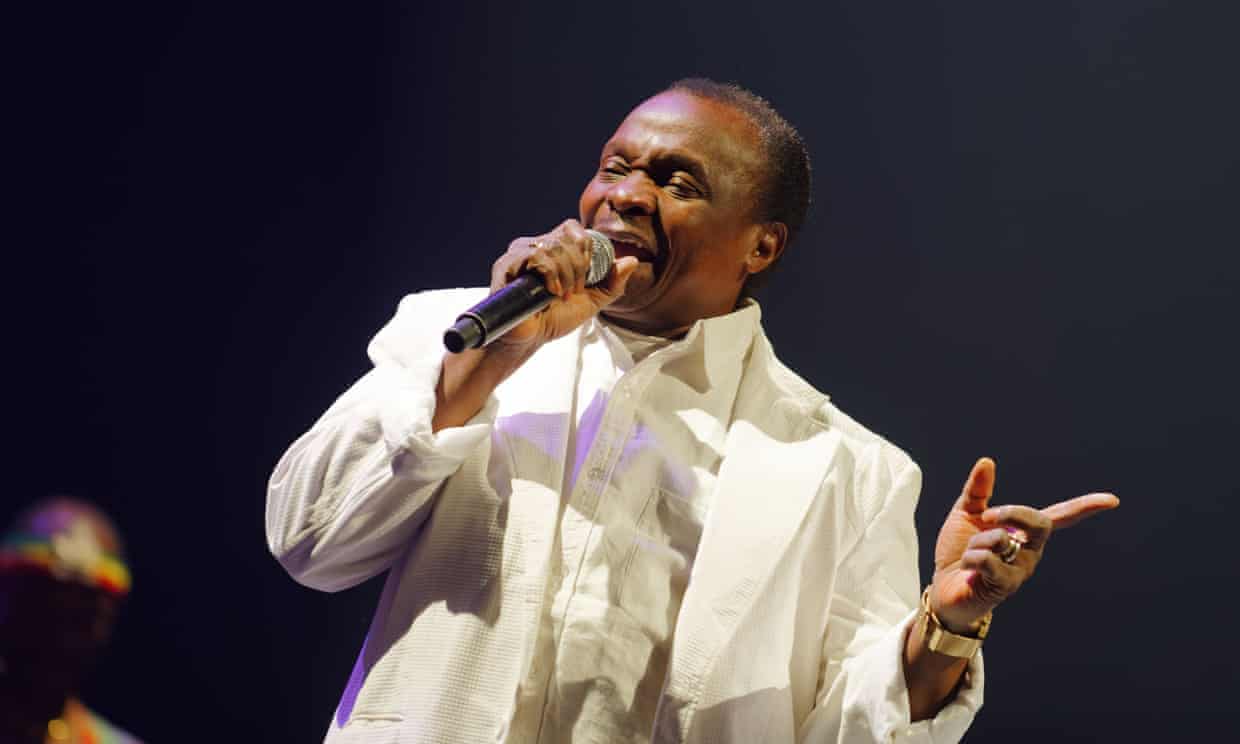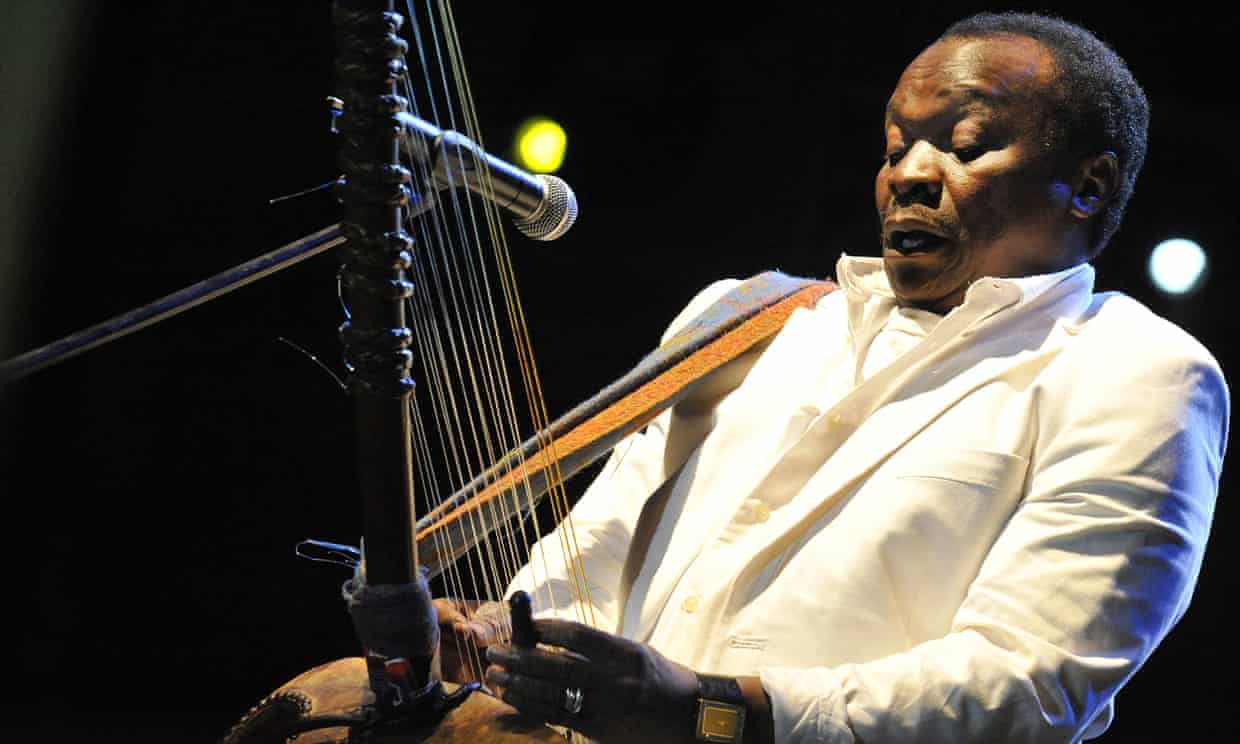
Music
Mory Kanté obituary
Singer and songwriter whose 1980s hit Yéké Yéké was Africa’s first million-selling single
by Robin DenselowMory Kanté, who has died aged 70 from untreated health problems, was a singer, songwriter, multi-instrumentalist and one of west Africa’s most versatile and commercially successful musical pioneers.
A national hero in Guinea, Kanté came from a jali or griot family of hereditary musicians and historians, and became known as the “electric griot” for his fusion of contemporary styles with traditional west African influences. His best known song, Yéké Yéké, was recorded in 1987 and became the first African single to sell over a million copies - as well as being the first international dance floor hit to feature the kora, the ancient west African harp.
Kanté played an amplified version of the instrument, which was matched against a stomping bass line, brass, drums, and a female chorus joining in with his distinctive, high-pitched vocals for the exuberant and catchy hook line. Yéké Yéké was No 1 in the pop charts in Spain and the Netherlands, and a Top 5 hit in Germany, Switzerland and France. It made three entries in the UK charts, reaching the Top 30 in 1988 and 1995 and then again, as a remix version, in 1996. The remix appeared on the soundtrack of the Danny Boyle film The Beach (2000).
Yéké Yéké made Kanté an international celebrity, just as African music was gaining new audiences in the west thanks to the growing interest in world music. But he was already well known across west Africa as lead singer with one of the region’s finest groups, the Rail Band. And as Lucy Duran, professor of music at SOAS, University of London, put it: “He was steeped in tradition.”
He was always destined to be a musician. Born in Albadarya, south-eastern Guinea, he was one of the youngest of 38 children. His father, El Hadj Djelifodé Kanté, was a local griot leader, while his mother, Fatoumata Kamissoko, was from a distinguished Malian griot family. Mory was taught to play the balafon, the African xylophone, attended a local French school and at 15 was sent to Bamako, the Malian capital, to live with his aunt, Manamba Kamissoko, a singer and griot. Here he continued his griot education while also listening to western and Cuban music and working as balafonist, guitarist and singer for the Apollos, a band much in demand at wedding festivals.
His musical skills came to the notice of one of Bamako’s most popular and adventurous groups, the Rail Band, who were employed by the National Railways of Mali to play at the Buffet Hotel De La Gare, next to Bamako railway station, where they performed anything from Cuban-influenced songs and French pop to ancient griot songs arranged for modern instruments. Salif Keita was their star vocalist, and Kanté was hired to play the balafon and guitar – though he also taught himself to play the kora and would occasionally take the microphone to remind audiences that Salif was not the only great vocalist on stage.

In 1973, Keita quit to join a rival band, Les Ambassadeurs, and Kanté took over as lead singer. The Rail Band became celebrities across west Africa, touring in Nigeria and the Ivory Coast while expanding their musical range to include funk and Afrobeat, and recording classic songs that ranged from Soundiata, a tribute to the founder of the Mandingo empire and Sinsimba, a tribute to Fela Kuti.
After leaving the Rail Band (who had been on strike demanding their salaries as state employees), Kanté moved to Abidjan, capital of the Ivory Coast, where he found that “people were crazy for modern music on traditional instruments”. He started a small band in which he sang and played kora, backed by other traditional instruments including balafon and djembe hand drums as he reworked salsa and western dance songs.
He had a residency at a fashionable city restaurant, where he was heard by Gerard Chess, director of the American label Eboni that specialised in disco and funk. His first solo album Courougnegne was released in 1981 and mixed in Los Angeles, where he had a “dream” meeting with Stevie Wonder.
Kanté wanted international success, and in 1984 he moved to Paris, where he eventually achieved his goal. His album À Paris (1984) included an early version of Yéké Yéké, and the next, 10 Cola Nuts (1986), was co-produced by Bruce Springsteen’s original keyboard player David Sancious and was nominated for the French Victoires De la Musique award, but it was not until Akwaba Beach (1987) that he became a major star. This was the best-selling album that included the hit version of Yéké Yéké, and its success was followed by high-profile events including a concert attended by tens of thousands in Central Park, New York, on French Bastille Day, 14 July 1990.
Always smartly dressed in white, Kanté became an African crossover celebrity with the status of a rock star – though his high-energy shows often included a traditional song as a reminder of his griot roots. And having discovered a winning formula he stuck with it. His 1990 album Touma achieved gold status in France, and was followed by Nongo Village (1993), Tatebola (1996) and Tamala (Le Voyageur) (2001) which included Nin Kadi, an easy-going collaboration with the English R&B singer Shola Ama.
In 2004 Kanté dramatically changed direction with Sabou, an all-acoustic album that included no keyboards or electro-percussion but provided an impressive reminder of his instrumental skills, not just on kora but on balafon, acoustic guitar and percussion. His soaring vocals and sense of urgency made this a classic set – and it would be his last for eight years.
He had homes in both Paris and in the Guinean capital, Conakry, where he had plans for an ambitious cultural institute and had already built a studio where he recorded part of his final album La Guinéenne.
In 2019 he was “guest vocalist” on an album by Las Maravillas de Mali, celebrating the music of a Cuban-influenced Malian band from the early 1970s, and appeared at a concert with this new version of the group at the London Barbican. He was still in excellent voice – and was of course wearing white.
He is survived by his wife, Sira Kouyate, and their seven children, Kebe, Tenin, Kader, Fatim, Zeynab and Marian (twins), and Mohammed, and by children from an earlier marriage.
• Mory Kanté, musician, singer and songwriter, born 29 March 1950; died 22 May 2020